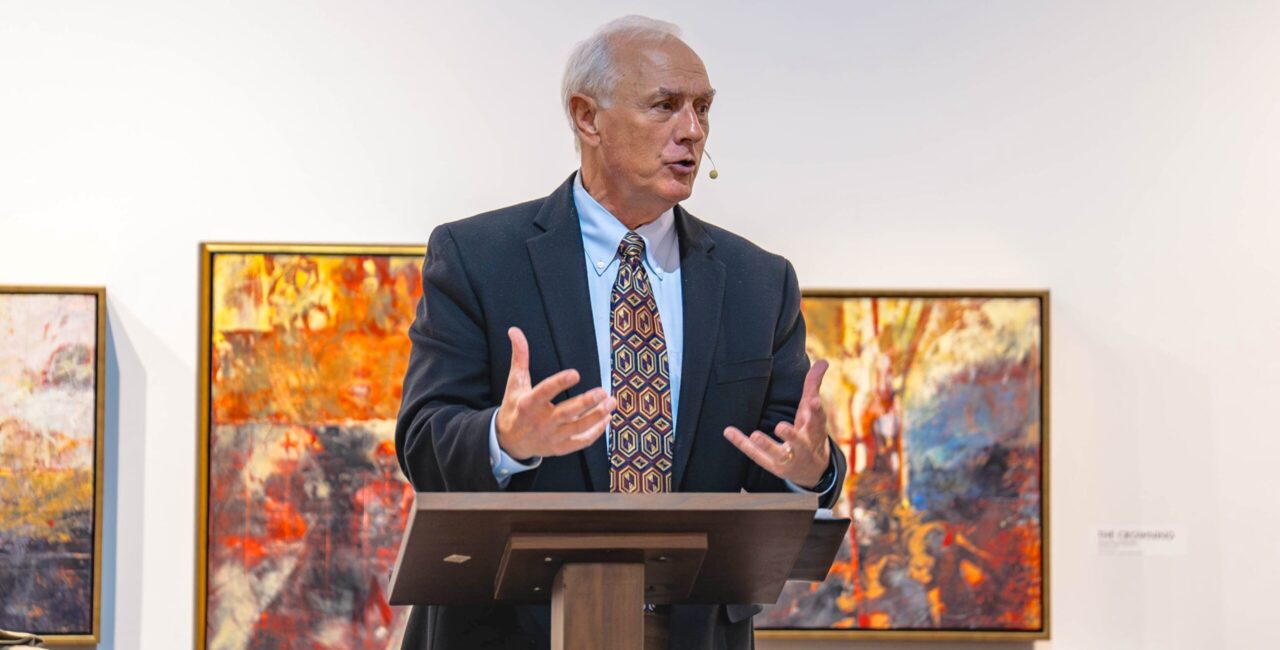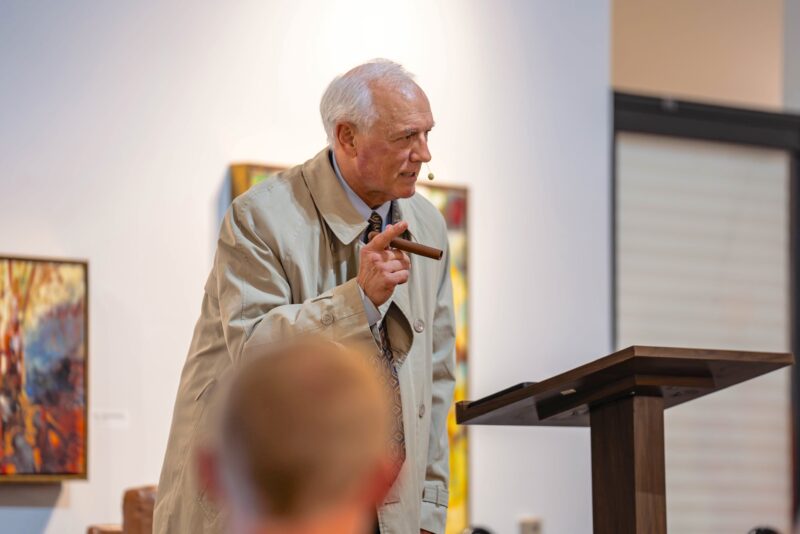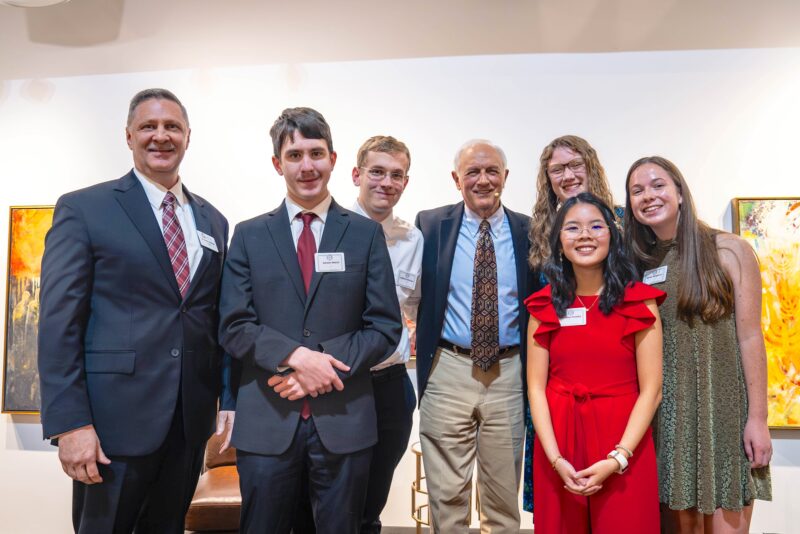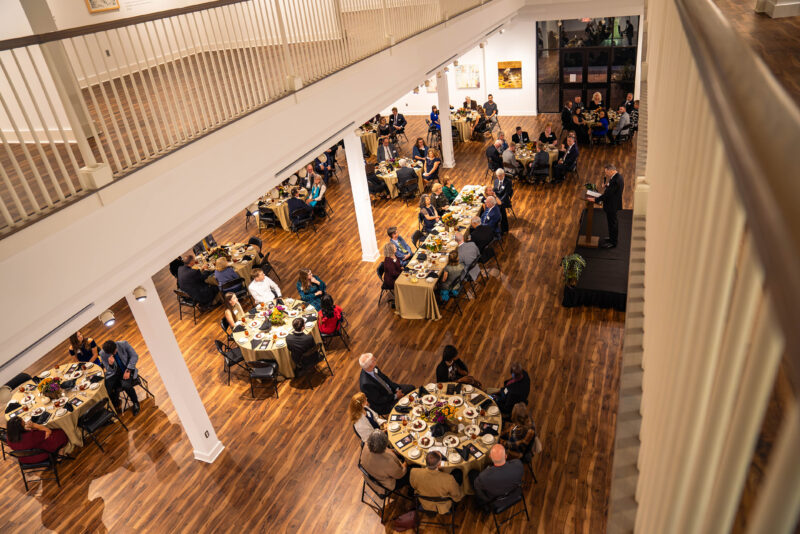
Garnet & Gold Forum speaker offers ‘gardening tools’ for Christians

“Before there can be any harvest, there must be a season of gardening,” Christian apologist and author Greg Koukl told his audience at Erskine’s Third Annual Garnet and Gold Forum, hosted in the Bowie Arts Center Oct. 25. “I think most Christians are gardeners.”
Citing difficulties with some evangelism efforts, Koukl, the founder and president of the apologetics organization Stand to Reason, endorsed the use of “pre-evangelism,” a process he calls “gardening” because it prepares the spiritual ground for a later harvest. He focused on how to engage others in meaningful spiritual conversations, saying he was providing “gardening tools” for Christians.
The speaker pointed out two problems that can occur in evangelism. First, hearers can be put off by a vocabulary that is not well understood outside the Christian community. Second, would-be evangelists can be intimidated by what they perceive as pressure to push people toward immediate conversion.
As he outlined in his book Tactics: A Game Plan for Discussing Your Christian Convictions, Koukl advised Christians to ask questions which seek to understand others’ viewpoints and offer opportunities for non-Christians to consider the logic of their own positions.

In a comic illustration of his emphasis on asking questions, Koukl donned a raincoat, produced a cigar, and did a creditable impersonation of Colombo, a scruffy TV detective who made his debut in the 1970s. The character is famous for a line usually spoken as he is winding up an interview but wants to ask another question— “Just one more thing.”
Asking questions enables Christians to be “on the offensive in an inoffensive way,” Koukl said. Two key questions are “What do you mean by that?” and “How did you come to that conclusion?”
Inquiring “What do you mean by that?” shows that you are seeking to understand someone’s viewpoint and gives the person a chance to examine his or her own beliefs. The question “How did you come to that conclusion?” allows the person to explain the logic behind a belief or position.
Underlying Koukl’s pre-evangelism practices is the desire to make people think. When he speaks to non-Christian audiences, he tells them, “I’m not here to convert you. I just want to put a stone in your shoe.”
During a Q&A session following Koukl’s talk, Erskine President Dr. Steve Adamson asked what led the apologist to develop his approach. Koukl said his is not a new method and is similar to the Socratic method. He tried to use what he found in the gospels and the Book of Acts as a model, he said, paying special attention to the way Jesus asks questions.

On the day before the Garnet & Gold Forum, Koukl explored the topic “What is Christianity?” with students. Dropping a box of puzzle pieces on the floor in Lesesne Auditorium, he said all the pieces must fit together to get a full picture of a worldview. When people use pieces from multiple belief systems, their view of reality is inconsistent. He summarized the Bible’s redemptive story, stressing to the students that since the Bible is “true to reality,” then “If you’re a Christian, this is your story. If you’re not a Christian, this is also your story.”
In addition to Tactics: A Game Plan for Discussing Your Christian Convictions, Koukl is the author of several books, including Street Smarts—Using Questions to Answer Christianity’s Toughest Challenges. He has hosted a call-in radio show for more than 30 years, advocating for “Christianity worth thinking about.” Stand to Reason, founded in 1993, teaches Christians “to think more clearly about their faith” and to defend Christianity and Christian values, according to the organization’s website.
See a video clip from Greg Koukl’s talk.
